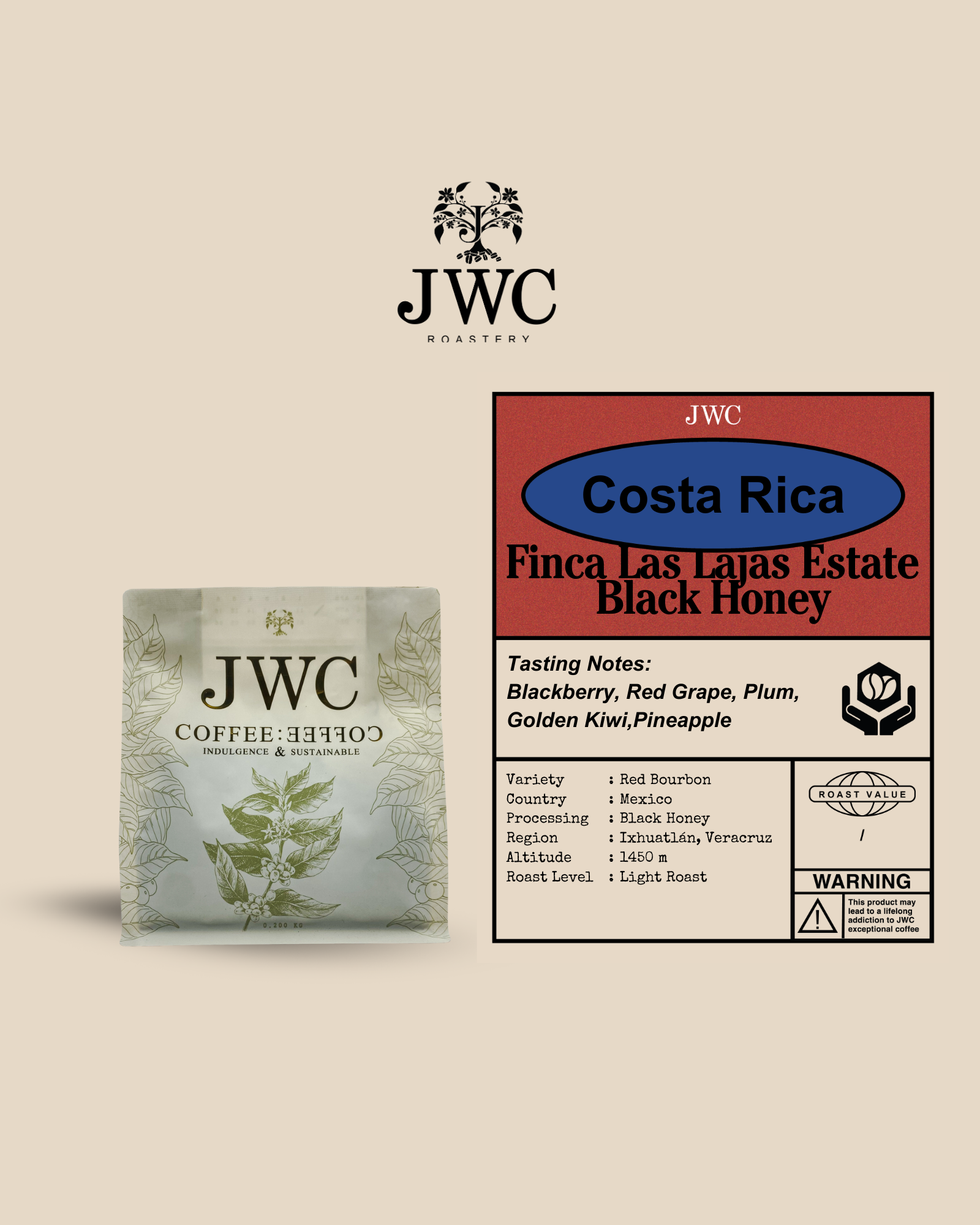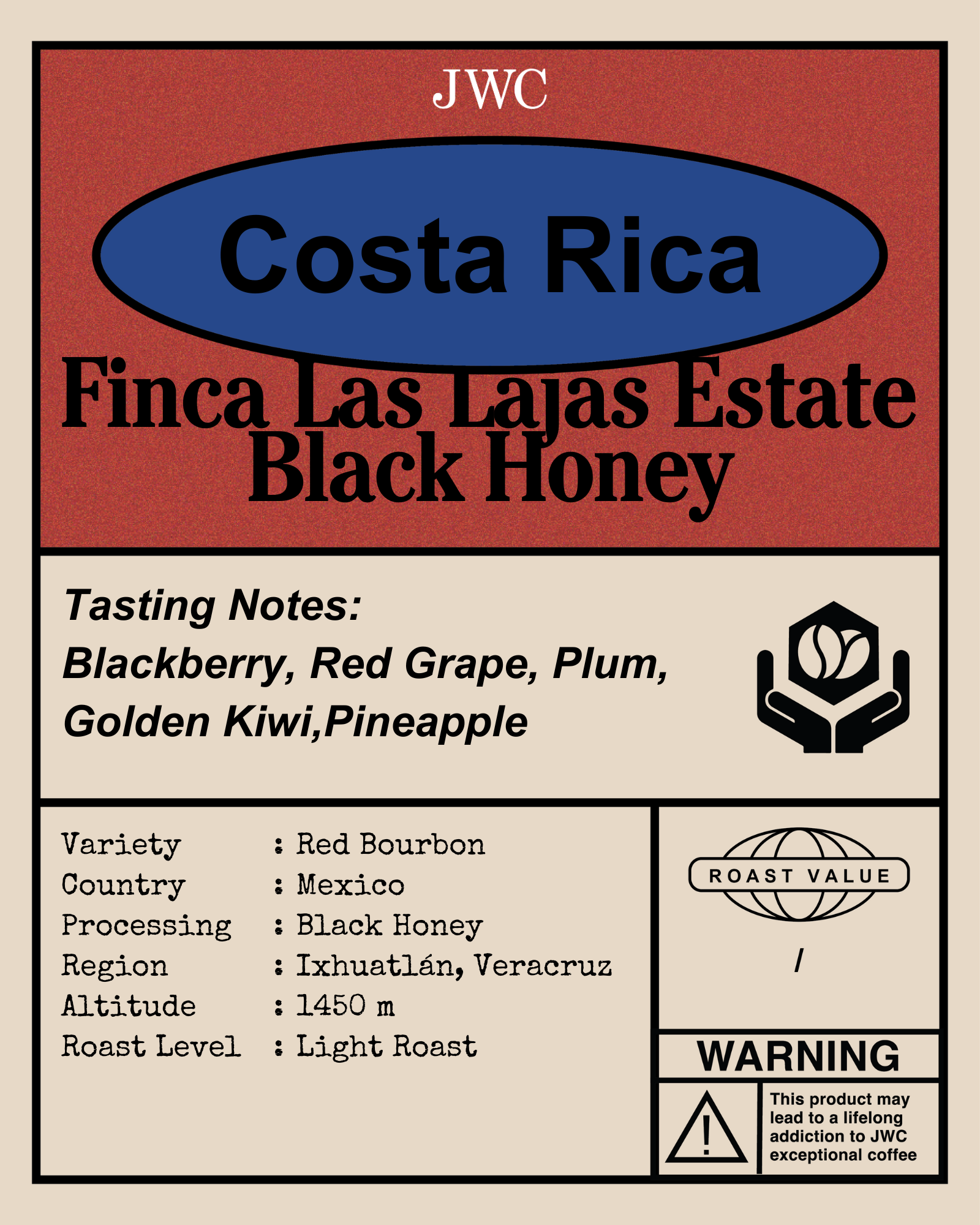

Costa Rica Finca Las Lajas Estate Black Honey
RM60.00 – RM250.00
| Variety | Catuai,Caturra |
| Country | Costa Rica |
| Processing | Black Honey |
| Region | Sabanilla |
| Altitude | 1300-1500 m |
| Roast Level | Light Roast |
| Tasting Notes | Blackberry, Red Grape, Plum, Golden Kiwi,Pineapple |
| Quantity | 200g/1000g |
Brewing Size Guide
| BREWING METHOD | BREW TIME | COFFEE TO WATER RATIO | BOTTOM-TOP SIEVE |
| Pour Over | 3:40 min | 1:16 | 400 – 800 µm |
| French Press | 10:00 min | 1:13 | 600 – 1000 µm |
| AeroPress | 2:20 min | 1:15 | 500 – 900 µm |
| Moka Pot | 1:30 min | 1:11 | 350 – 700 µm |
| Drip Brewer | N/A | 1:17 | 400 – 900 µm |
| Espresso | 0:26 min | 1:2 | 250 – 500 µm |
| Cold Brew | 16 hours | 1:10 | 600 – 1100 µm |
| Syphon | 1:40 min | 1:15 | 400 – 800 µm |
Blackberry, Red Grape, Plum, Golden Kiwi,Pineapple
| Variety | Catuai,Caturra |
| Country | Costa Rica |
| Processing | Black Honey |
| Region | Sabanilla |
| Altitude | 1300-1500 m |
| Roast Level | Light Roast |
| Tasting Notes | Blackberry, Red Grape, Plum, Golden Kiwi,Pineapple |
| Quantity | 200g/1000g |
About This Coffee :
Farm Overview
Finca Las Lajas is a family-owned coffee estate located in Sabanilla de Alajuela, Costa Rica, nestled on the fertile slopes of the Poás Volcano. Owned and managed by the Chacón family, the farm has a long-standing tradition of coffee cultivation, dating back over 80 years. The estate operates at an altitude ranging from 1,300 to 1,650 meters above sea level, providing optimal conditions for high-quality Arabica coffee production.
The Chacón family has become an industry leader in experimental coffee processing, particularly in the development and refinement of honey and natural processes. They have embraced sustainable and organic farming practices, earning certifications and recognition in the global specialty coffee market. Their dedication to ecological balance includes shade-grown coffee systems, natural composting, and water conservation techniques, making them pioneers in eco-friendly coffee farming.
Region Characteristics
Sabanilla de Alajuela, where Finca Las Lajas is located, benefits from a unique microclimate influenced by the nearby Poás Volcano. The volcanic soils are rich in minerals, contributing to the distinct flavor profiles of the coffee. The region experiences consistent rainfall, mild temperatures, and abundant sunshine, creating an ideal environment for growing specialty coffee.
The surrounding area is characterized by dense forested landscapes, which the Chacón family integrates into their farming model. This biodiversity supports natural pest control and enhances soil health. The farm’s elevation ensures slower coffee cherry maturation, allowing sugars to develop fully, resulting in complex cup profiles.
Processing Method: Red Honey
The Red Honey Process, a hallmark of Finca Las Lajas, involves removing the coffee cherry skin while leaving 100% of the mucilage intact. This sticky, sugar-rich layer ferments as the beans are dried on raised African beds. To achieve the characteristic “red” honey profile, the drying process is closely monitored, with beans turned only sparingly to retain natural fruit flavors and prevent over-fermentation.
Drying times vary depending on weather conditions, typically lasting 10 to 14 days. The Chacón family’s mastery of this method produces coffees with pronounced sweetness, medium body, and bright acidity. The process also highlights fruity and floral notes, making Red Honey coffees a favorite among specialty roasters.
Finca Las Lajas is widely regarded as one of the first farms in Costa Rica to experiment with honey processing. Their dedication to innovation has elevated their reputation, with their coffees frequently appearing in barista competitions and earning awards.
Flavor Profile and Characteristics
The Red Honey coffee from Finca Las Lajas is celebrated for its bright and fruity profile, with tasting notes that include red berries, citrus, and tropical fruits. The processing method contributes to its honey-like sweetness and balanced acidity, creating a vibrant cup that reflects the terroir of the region. It is a versatile coffee, suitable for both espresso and filter brewing, and appeals to coffee enthusiasts seeking a well-rounded, sweet, and complex experience.
| Pack Quantity |
200g ,1kg |
|---|
Each Brewing Method Grind Size Reference
| BREWING METHOD | BREW TIME | COFFEE TO WATER RATIO | BOTTOM-TOP SIEVE |
| Pour Over | 3:40 min | 1:16 | 400 – 800 µm |
| French Press | 10:00 min | 1:13 | 600 – 1000 µm |
| AeroPress | 2:20 min | 1:15 | 500 – 900 µm |
| Moka Pot | 1:30 min | 1:11 | 350 – 700 µm |
| Drip Brewer | N/A | 1:17 | 400 – 900 µm |
| Espresso | 0:26 min | 1:2 | 250 – 500 µm |
| Cold Brew | 16 hours | 1:10 | 600 – 1100 µm |
| Syphon | 1:40 min | 1:15 | 400 – 800 µm |
So, How Do You Know What Grind To Use?
Here’s a handy guide. Save it to your phone, share it with all your friends. You’ll never need another guide!
- Coarse: Coarse grinds are chunky pieces of coffee beans, similar to coarse sea salt
- Medium-Coarse: Saddling between coarse and medium, this grind looks like rough sand
- Medium: The middle of all grind sizes, medium grounds are similar to the consistency of sand
- Medium-Fine: The medium-fine grind is a staple grind size, with texture like table salt
- Fine: Finer than table salt, fine grind is typically the size of most pre-ground coffee
Only logged in customers who have purchased this product may leave a review.



Reviews
There are no reviews yet.